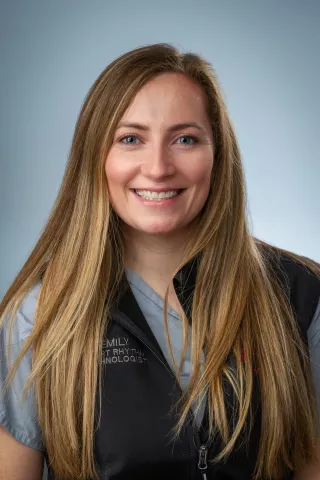
At the Heart of Care: Emily Murtagh's Vital Role as an Electrophysiology Technologist

If you walk through the bustling halls of St. Paul’s Hospital in downtown Vancouver, you might find Emily Murtagh, an Electrophysiology (EP) Technologist, making use of a complex array of monitors and equipment that help her understand and manage each patient’s heart rhythms with precision and compassion. Now in her 8th year at St. Paul’s and as an EP instructor at BC Institute of Technology, she plays a key role in ensuring British Columbians receive appropriate cardiac care.
But her journey into EP and her life in BC wasn’t exactly planned. In fact, she actually came to Vancouver on a bit of a whim.
“A friend from England had moved here years before and he sent us a picture, and it looked beautiful,” Emily shared. “Me and my now husband said let’s go; we quit everything back in Manchester and decided to travel. We ended up in Vancouver and just hoped for the best.”
Prior to moving to Canada, Emily had about a decade of experience working as a cardiac physiologist in Manchester, where her daily work involved a variety of responsibilities, from non-invasive electrocardiogram (ECG) monitoring to more advanced procedures in the catheterization labs. She holds advanced certifications from the International Board of Heart Rhythm Examiners, which made for a smooth transition when she found a role at St. Paul’s.
“I was fortunate to have certifications to prove my experience,” she says, referencing her qualifications. “By the time you’ve done that level of training, I came here and they just said ‘we can hire her!’ I think these positions would have been so competitive back in the UK.”
Emily highlights that this isn’t always the case for health science professionals with international experience. EP technologists looking to move to BC from abroad would generally have to retrain through BCIT unless they are already quite experienced or hold specific high-level accreditations.
“We’ve really struggled to get them into the system,” Emily says. “I’ve had people from the UK and Australia get in touch, but I don’t know of anyone else that we’ve managed to hire who has come from abroad.”
Much like the rest of health care in BC, EP technologists struggle with workforce shortages and low pay relative to the skills they provide. Although Emily has trained other techs, holds multiple certifications, and has supervisory responsibilities, it’s been a struggle to gain recognition and fair pay for specialized skills—a problem that has discouraged potential EP technologists from training for the role and has led St. Paul’s to stop advertising for open EP technologist positions.
Under the new classification system, Emily will be finally classified and paid as a supervisor at St. Paul’s once she returns from maternity leave. But she recognizes that there’s still a lot of work to do.
“That’s a huge win, personally, but we still need to be hiring more technologists, and we need to make sure that we have a supervisor in each hospital,” Emily says. “We rely so heavily on company representatives that make pacemakers or implantable cardiac defibrillators for free labour when really we need more technologists.”
With the upcoming contract negotiations, Emily and her colleagues, like many other HSA members, are advocating for tweaks in the new classification system. With the support of her union, she’s hopeful that further changes to compensate specialized skillsets accordingly will help attract and retain talent in electrophysiology.
Until then, Emily and her close-knit team at St. Paul’s rely on each other to handle the high stakes demands of the clinic. Day in and day out, patients at the hospital appreciate the light-hearted and supportive environment while resting easy with the knowledge that they’re in safe hands with Emily.
“When patients come in, they really feel that there’s something very special here, they relax, and trust us with their treatment,” Emily shares. “So many patients pick up on the vibe that we’re having quite a good time while we work and that we’ve been doing this for a long time.”